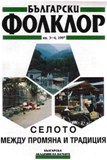От предкапитализъм към ранен капитализъм. Трансформация на селото и селското стопанство на Балканите от XIX век до Втората световна война
From Pre-Capitalism to Early Capitalism. The Transformation of the Village and of Agriculture in the Balkans from the 19th Century to the Second World
Author(s): Holm SundhaussenSubject(s): Anthropology
Published by: Институт за етнология и фолклористика с Етнографски музей при БАН
Summary/Abstract: This article focuses on the pre-socialist processes of transformation in Balkan societies from the beginning of national independence to World War II. The development in the post-Ottoman Balkan states was characterized by a relatively high speed of transformation (“Westernization”, “Europeanization”) in nearly all sectors of society. In an attempt to eliminate the Ottoman legacy and the traditional habits of the Balkan peasants, the “modernizers” started a radical program to build a modern state – irrespective of the social costs for the vast majority of the population. The lack of traditional Christian institutions under Ottoman rule was replaced by an abundance of new state-oriented institutions which were established according to Western models but functioned according to Oriental practice. In the course of this post-Ottoman institutional revolution, the traditional Balkan village as the most important multifunctional institution of Christian peasants under Ottoman rule was totally transformed. But the speed of mentality change lagged far behind the speed of state institutional reform. The outcome of this time lag was the degeneration of the village to a transmission belt of the new central power, and the economic as well as political marginalization of the peasants. The author argues that the changes in political, legal, and economic institutions after the establishment of nation states were rapid, irreversible, and strongly influenced by foreign models. However, they did not sufficiently take into account the low capacity of change in the predominantly agrarian population. The outcome was not a modern capitalist society but a mixture of pre-capitalist and capitalist (market and non-market) elements in a highly fragmented society. The Balkan village fell into a state of agony long before the socialist regimes began to impose their models of forced industrialization at all costs. A reorientation of post-socialist societies to pre-socialist paths of development is neither possible nor is it desirable.
Journal: Български фолклор
- Issue Year: XXIII/1997
- Issue No: 3-4
- Page Range: 6-25
- Page Count: 20
- Language: Bulgarian
- Content File-PDF

